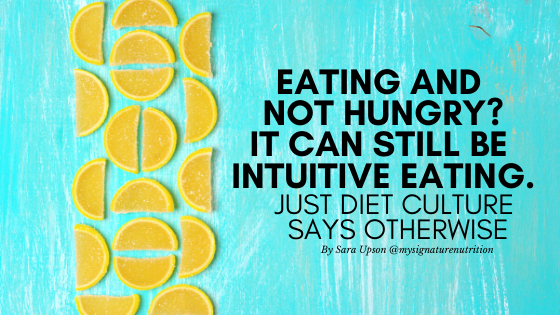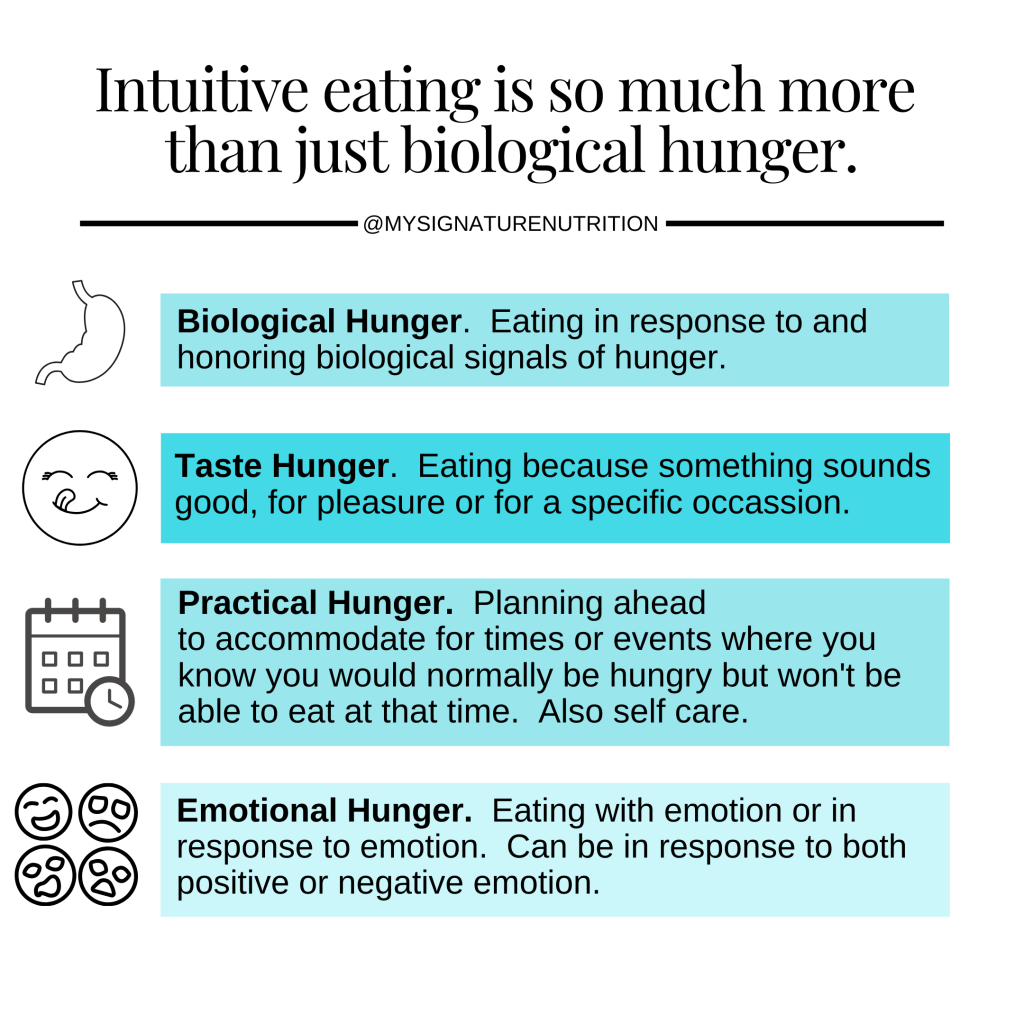Eating and not hungry? It can still be intuitive eating. (Just diet culture says otherwise.)
April 28th, 2020 by Sara Upson

During quarantine for COVID-19 I’ve been posting frequently about eating consistently to support eating disorder recovery, healing your relationship with food, and self care in general. While most people have found these posts supportive, some people have decided instead to tell me about how I’m incorrect and that they’re eating “intuitively,” listening to their body, not hungry and don’t need to eat. 😳
These responses have happened enough that it’s made me realize that there’s a lot of confusion about intuitive eating, and that diet culture has manipulated a lot of people to believe that intuitive eating is only eating when hungry- but that’s not true.
Intuitive eating includes eating in response to biological hunger AND intuitive eating also includes eating for other reasons too: taste hunger, practical hunger, self care, and emotional hunger- to name a few.

Biological hunger is eating in response to hunger cues. When people think of intuitive eating and hunger this is generally what first comes to mind. That your body feels hunger and then you respond.
Hunger can present in many different ways including: stomach pangs, stomach growls, food thoughts, feeling at the back of you throat, dizzy, weak, emotional, headache, to name a few.
While intuitive eating includes eating in response to biological hunger it’s not limited to hunger. The belief that it’s only hunger is diet culture and actually restrictive- which is not consistent with intuitive eating.

Practical hunger is planning ahead to accommodate for times or events where you would normally be hungry but wouldn’t be able to eat at that time. It’s also eating consistently to meet your nutrition needs even though you don’t feel hungry. Practical hunger is a form of self care. It’s responsive to your needs even if you don’t feel them physiologically.
There are many reasons you might not feel hunger: recovering from an eating disorder, a history of chronic dieting, depression, grief, anxiety, ptsd, stress, poor self awareness, chaos/busyness, illness. The thing to remember is that even if you don’t feel hungry, your body still needs food!
When you believe that intuitive eating is only about eating in response to hunger then you miss a lot of important reasons to eat, feel guilty for eating in response to caring for yourself, and miss out in establishing more consistent hunger cues.
If you don’t have hunger cues- particularly from a history of dieting or an eating disorder then to establish cues there is often a period of eating when you’re not hungry to help retrain your body to feel hunger. This is a necessary part of becoming an intuitive eater and essential self care (feeding your body to meet your basic needs).

When diet culture manipulates intuitive eating to be just about hunger it’s confusing in the least and extremely harmful at the most. It interferes with the core of intuitive eating and reestablishing body trust which in the beginning sometimes requires more structured eating to develop biological hunger cues.
Sometimes practical hunger is solely self care- making sure that you’re eating consistently when food doesn’t sound good or you have no desire to eat. Eating for this reason can be so hard- especially when diet culture reinforces it as bad- but it’s essential to recovery and becoming an intuitive eater.
Taste Hunger is eating because something sounds good, for pleasure or for a specific occasion– even when you’re not hungry.
Diet culture says this is bad and you might be tempted to feel that way too, but it’s intuitive eating! How? Why? The difference is that when eating in response to taste nutrition- you’re aware that you’re not hungry and you’re choosing to eat anyways. It’s choosing to eat because you want to enjoy the taste of the food. This is intuitive eating too!
Emotional hunger is eating with emotion or in response to emotion. The emotion can be either positive or negative.
Diet culture is also quick to judge and condemn emotional eating, but it’s not a bad thing. Eating with emotions is a powerful coping skill and connector to family, culture, history, and memories.
It’s also intuitive eating and often eating when not hungry. Yes, emotional hunger can become problematic when it’s the only coping skill you have. This is compounded by restriction, self criticism, guilt, shame and diet culture.
Diet culture boils intuitive eating down to only eating when hungry but it’s so much more than that. It includes knowing and establishing biological hunger and also eating for other reasons!
The difference with intuitive eating is that you’re aware of your body sensations, emotions, can distinguish thoughts and emotions from biological cues, and can take steps to nourish your body even when you don’t feel hungry. Intuitive eating has a lot of nuance and is so much more than just eating when hungry.
To help you get started I recommend the book Intuitive Eating, as well as the Workbook
. From the workbook, specifically this exercise to help differentiate thoughts, biological hunger and self care. In the style of that exercise consider the following statements and determine which is self care, thought or biological hunger.
- I shouldn’t be hungry I just ate.
- I’m not hungry but know I will be in the middle of my class and won’t be able to eat then- so I’m eating now.
- A turkey sandwich sounds good.
- My stomach is growling.
- I haven’t had much of an appetite since my mood dropped, but I’m working to eat in a schedule every 2-4 hours to help me stay nourished.
- I really want some carrot cake, but after everything I’ve eaten I don’t need it
Answers: 1. Thought, 2. Self Care/Practical, 3. Biological and Thoughts, 4. Biological, 5. Self Care, 6. Thought.
Comments are closed.





